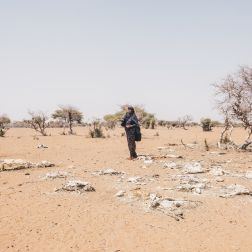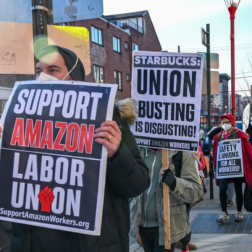- 7 mins read time
- Published: 1st December 2014
Rigged rules that create inequality can be changed
Extracted from address given at a joint event hosted by Oxfam Ireland, the Institute for International and European Affairs (IIEA) and Irish Aid at the IIEA in Dublin on Thursday, November 27th. The theme of the discussion was 'Inequality: The defining challenge of our time'. The Millennium Development Goals were signed in 2000 with the intention of making substantial progress on human development by the year 2015.
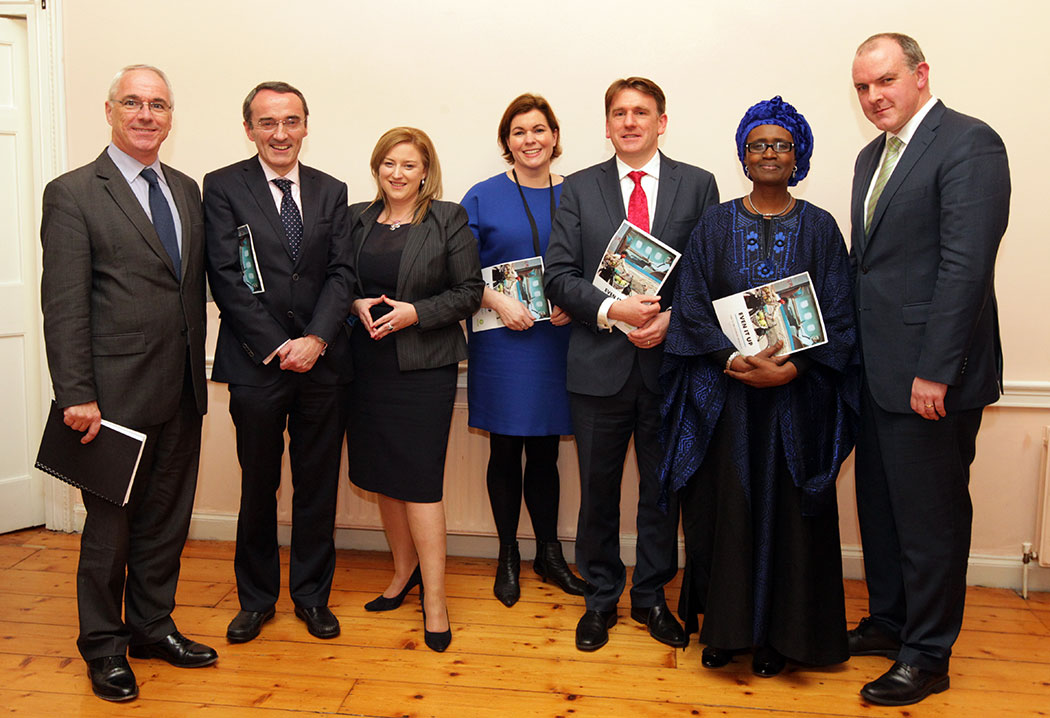
From left to right: Michael Gaffey, Director General, Irish Aid; Cormac Lucey, Chartered Accountant and Lecturer in Finance at UCD, IMI and Chartered Accountants Ireland; Dearbhail McDonald, Associate Editor and Legal Editor of the Irish Independent; Alison O’Connor, Irish Examiner; Jim Clarken, CEO, Oxfam Ireland; Winnie Byanyima, Executive Director, Oxfam International; Dr Colm O’Reardon, Economist and former Government Advisor at the inequality debate at the Institute of International and European Affairs in Dublin. Mark Stedman/Photocall Ireland
2015 is almost upon us and next September, world leaders will be reflecting on the fact that during that period:
- Extreme poverty was reduced by 50%
- 90% of all children are now attending primary school
- Maternal mortality has been reduced by 50%
- We have reached the Millennium Development Goal target in relation to the number of people who have access to safe sanitation
- We have made good progress on the fight against major killer diseases such as HIV and AIDS, TB and malaria
- We are very slowly winning the fight against extreme poverty.
However, these successes and our realistic ambition to end extreme poverty by 2030 and to advance many other areas of human development during this next period are deeply threatened by the extreme and rising inequality.
The emergence of some parts of the world from what appears to be extreme poverty is heavily masked by the fact that wealthy elites in poor and middle income countries have become extremely wealthy whilst poor people have remained stuck in poverty.
Two countries that have emerged as economic powerhouses (albeit of differing scales and on different trajectories) in recent years are India and Brazil. In the past 20 years, India has emerged as one of the most important economies on the planet. Within the next couple of years, it will have more billionaires than the US and it has its own space programme. Yet 400 million Indian citizens live in extreme poverty. For most, the economic miracle has had little or no impact.
Brazil has also emerged as a global power with tremendous economic success. But it is a country where the bottom half did not get left behind – or certainly not to the same extent. The main reason why India is so unequal while Brazil is reducing inequality among its citizens is simple – government policy.
Brazil had a very focused investment in health, education and a social protection floor to protect people on the bottom rung, where India did not. The trajectory for most Brazilians is now one where optimism and hope for a better life is a reality. The same cannot be said for 400 million Indians.
Emerging from the financial crisis, the global economy is slowly strengthening and growing. Ireland too is currently emerging from the worst economic crisis in living memory. No part of society here has been spared from the impact of this but we know that those most well off were least affected.
According to Social Justice Ireland Budget Review 2015, more than 750,000 people live in poverty (including one in five children) and Budget 2015 has widened the rich/poor gap in Ireland by €499 per year.
Too much of today’s global growth is neither inclusive nor sustainable. Governments, institutions and corporations have a collective responsibility to tackle extreme inequality.
And the right policy choices are crucial in changing the tide and allowing many more millions of people to lift themselves out of poverty instead of condemning future generations to it.
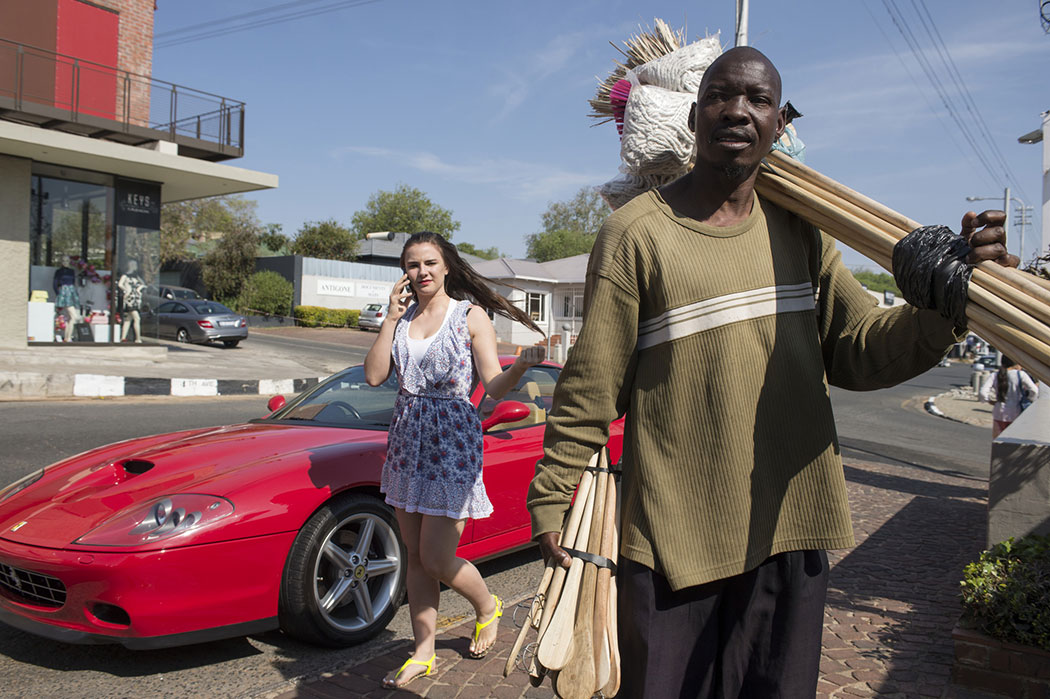
Above: Leonard Kufeketa (39), a brush seller, stands in front of Ferarri in Parkhurst, an expensive suburb of Johannesburg. “Things are changing in South Africa for the worst,” he says. “The public schools are no good. Those in the government, they are very rich, the rest of us are poor.” South Africa is one of the most unequal societies in the world. Zed Nelson/Oxfam
Oxfam’s new report, Even it Up: Time to end extreme inequality, shows the scale of the problem of extreme economic inequality, and reveals the multiple dangers it poses to people everywhere.
Most importantly, the report highlights some of the concrete steps that can be taken to change things. So, let’s talk about the solutions.
These measures are:
1. Support a global goal to end extreme economic inequality in every country by 2030. (The effect of curbing inequality would be as dramatic as would be the failure to act. In India, for example, halting the recent increase in inequality could enable 90 million more people escape extreme poverty by 2019).
2. Act decisively on the toxic global taxation system which has been denying citizens in developing countries and in this part of the world the resource which is duly theirs.
3. Aim to achieve universal free public services by 2020. People’s right to free public health and education should be a cornerstone of policy and investment in health and education makes a huge impact on the lives of poorer people.
4. Pay workers a living wage instead of minimum wage (a fair amount to allow them to live rather than just survive) and close the income inequality gap.
5. Promote women’s economic equality and women’s rights (Women in many countries won’t be paid as much as men for another 75 years) and within that focus on a woman’s right to live free from violence.
6. Implement a universal social protection floor.
7. Target development finance at reducing inequality and poverty.
While all these measures deserve a full debate, I’d like to particularly focus on taxation as a key tool.
There is evidence that globally our economic system is set up to facilitate tax dodging by multinationals and wealthy individuals.
Governments around the world are losing €120 billion in revenue each year, according to a 2013 Oxfam study, putting more pressure on their finances as they look to balance their budgets by hitting ordinary citizens with higher taxes.
The tax gap for developing countries – the amount of unpaid tax liability of companies – is estimated at $104bn every year, including profits shifted in and out of tax havens.
Until the rules are changed and there is a fairer global governance of tax matters, tax dodging will continue to drain public budgets and undermine the ability of governments to tackle inequality.
To give a specific example, the world is now grappling with the Ebola crisis. Liberia is one of the worst affected countries. Liberia has 51 doctors for its entire population. This is a country the same size as Ireland. If Liberia received what it is entitled to it would be much better equipped to handle this crisis.
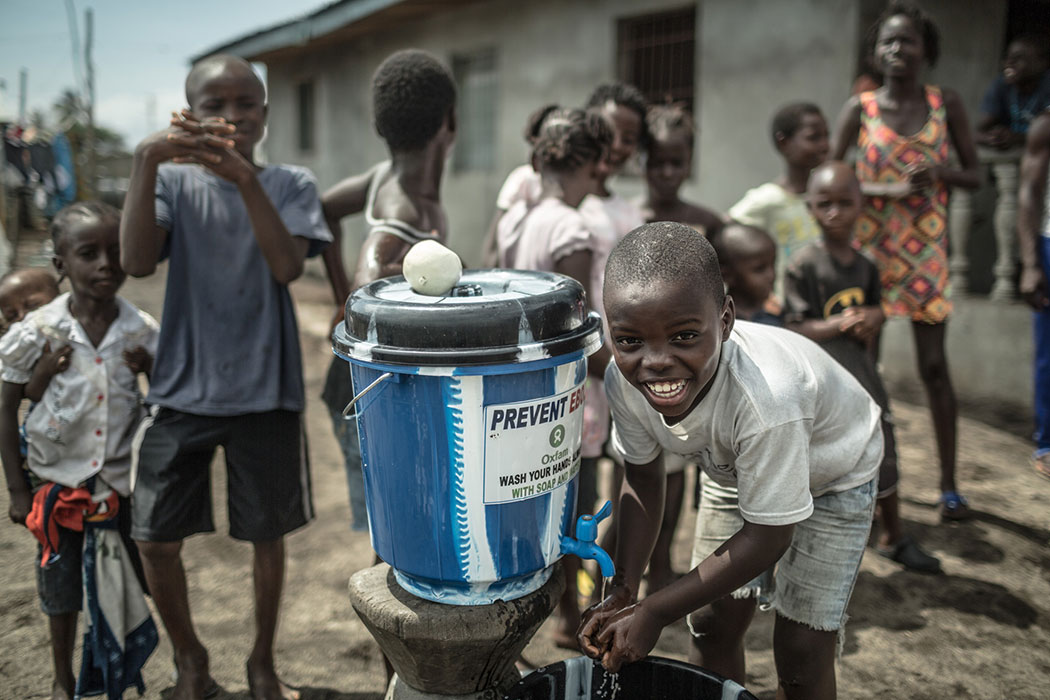
Above: Children learn about the importance of hand-washing training through an Oxfam Ebola programme in Liberia where there are only 51 doctors for a population of 4.2 million people. Pablo Tosco/Oxfam
The economic inequality demonstrated in Liberia also highlights the fact that the world’s poorest citizens are also the world’s most vulnerable citizens – without the resilience and support systems to be able to cope with crisis. Oxfam sees evidence of this in every emergency response we carry out – responding to disasters costs a lot more than preventing them in the first place. Reducing inequality would reduce the need for support when a disaster strikes.
Inequality is not inevitable – it’s the result of years of rigged rules, like rigged tax rules that allow the richest people and corporations to avoid paying their fair share.
But these rules can be changed in favour of the many.
There is a lot to do. Tonight, one in every seven of us sharing this planet will go to bed hungry. Tomorrow morning, there will be 60 million children of primary school age who won’t be going to school. It is not so long ago that people across Ireland were in a similar position.
The answer is justice: fair use of the world’s natural resources; a global economy that reduces inequality; a world that does not discriminate against women or minorities.
Inequality and sustainability are unifying global concerns. People across all walks of life, across the political spectrum, and even the richest people on earth are close to agreement that major change is needed.
So we have a shared agenda. Now what's needed is a shared plan of action. If we don’t take action fast, we will soon live in a world where equal opportunity is just a dream.
Jim Clarken is Chief Executive of Oxfam Ireland
RTE’s Morning Ireland interview with Jim Clarken on inequality and Lux Leaks
